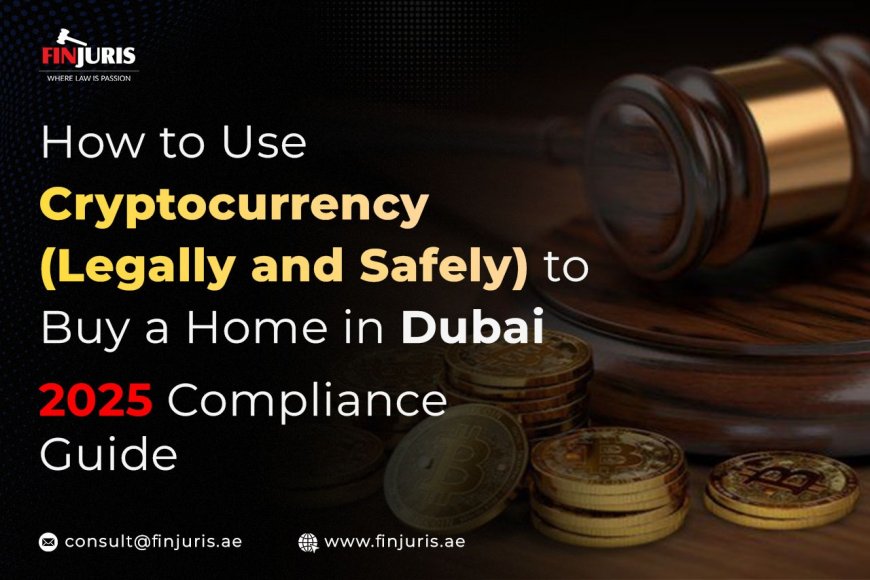How to Use Cryptocurrency (Legally and Safely) to Buy a Home in Dubai — 2025 Compliance Guide
Learn how to legally and safely buy a home in Dubai using cryptocurrency in 2025, with a full compliance and regulation guide.

1. Market Overview: The Rise of Crypto-Backed Real Estate in 2025
Dubai’s real estate market continues to set benchmarks globally, both in terms of transaction volume and regulatory innovation. In recent years, one of the most notable developments has been the legal and secure integration of cryptocurrency as a payment method for property purchases. Bitcoin, Ethereum, and regulated stablecoins such as USDT and USDC are now being accepted by a growing number of developers and real estate brokers in the emirate.
This trend has been driven by several factors. First, Dubai has positioned itself as a leading global hub for blockchain and digital asset innovation. Second, high-net-worth individuals holding significant cryptocurrency reserves are actively seeking to diversify into tangible assets like real estate, which offer both appreciation potential and a stable store of value. Third, the establishment of regulated payment channels through licensed Virtual Asset Service Providers, or VASPs, has made these transactions not only possible but also compliant with strict UAE property and financial laws.
In early 2025, more property listings than ever before feature cryptocurrency payment options. Luxury developments, high-demand off-plan projects, and even some commercial properties are now advertised with the choice to pay in crypto, making the phrase “buy property crypto Dubai” more than just a marketing hook—it is a viable, regulated option.
Read more: Dubai Moves Toward Smart Real Estate Investment with Crypto.com Blockchain Deal
2. Legal Position: Can You Buy Real Estate in Dubai with Crypto?
The answer is yes, but it comes with a clear legal structure. A buyer can purchase real estate in Dubai using cryptocurrency only if the transaction follows the emirate’s established compliance framework. The key element is that the payment must be converted into UAE dirhams before the seller receives the funds. This conversion is handled by a VARA-licensed intermediary, ensuring the transaction is traceable, lawful, and meets anti-money laundering (AML) and counter-terrorism financing (CFT) requirements.
Direct wallet-to-wallet transfers between a buyer and a seller, without going through an approved intermediary, are not recognised by the Dubai Land Department (DLD) and cannot be used for legal title registration. All legitimate crypto-to-property transactions in Dubai are routed through an official process that combines blockchain transfer efficiency with the legal protections of the AED-denominated property market.
3. Regulatory Framework Governing Crypto Property Purchases
The legal foundation for these transactions rests on several pillars. The UAE’s Federal Decree-Law No. 20 of 2018 on Anti-Money Laundering and Combating the Financing of Terrorism sets out the obligations for identifying clients, verifying the source of funds, and reporting suspicious activity. This law applies to all high-value transactions, including property purchases funded by digital assets.
Cabinet Decision No. 10 of 2019 builds on the AML/CFT law by providing detailed guidance for due diligence, enhanced due diligence in high-risk cases, and reporting obligations. These requirements mean that a buyer using cryptocurrency will face the same or stricter scrutiny as a buyer paying via bank transfer.
VARA’s Virtual Asset Rulebooks introduce licensing requirements for VASPs and specifically regulate crypto-to-fiat conversion for property purchases. Only licensed entities can process such payments, and they must maintain transaction records, conduct KYC checks on both parties, and comply with reporting standards.
The DLD’s own guidelines add another layer, requiring that all property transfers be denominated in AED, that the payment be verified as coming through a licensed processor, and that compliance checks be completed before issuing the title deed.
4. Role of the Dubai Land Department (DLD)
The DLD ensures that property ownership transfers, whether paid for in cash, via bank transfer, or using cryptocurrency, meet all legal requirements. In a crypto transaction, the DLD confirms that the AED payment came from an approved intermediary, verifies that both parties have completed KYC and AML procedures, and registers the property in the buyer’s name in the official property registry.
Without DLD registration, there is no legal recognition of ownership. This is why using licensed processors and documented compliance steps is non-negotiable.
5. Role of VARA in Regulating Crypto-to-Property Transactions
The Virtual Assets Regulatory Authority acts as the oversight body for all crypto-related activity in Dubai outside the DIFC. In the context of real estate, VARA ensures that only licensed processors handle crypto payments, that these processors meet international AML/CFT standards, and that all transactions are transparent and traceable. They also require licensed entities to keep transaction records for a minimum of five years and to report any suspicious or high-risk activity to the UAE’s Financial Intelligence Unit.
Read More: What Is a VARA License? A Guide to Dubai’s Regulatory Gold Standard for Virtual Assets
6. Step-by-Step Guide to Buying Property with Crypto in Dubai
The process begins with identifying a property where the developer or seller has arrangements with a VARA-licensed payment processor. Not all properties are eligible for crypto purchases, so this should be confirmed before entering negotiations.
Once a suitable property is identified, the buyer must work with a DLD-registered broker or developer. These professionals will liaise with the payment processor to set up the compliance and payment process.
The buyer then selects the licensed payment processor, who will act as the bridge between the buyer’s crypto wallet and the seller’s AED bank account. Before any transfer is made, the buyer must undergo full KYC and AML verification. This includes providing a passport copy, proof of residential address, proof of ownership of the crypto assets, and evidence of the source of those assets.
After compliance checks are complete, the buyer and seller agree on the AED price, and the crypto amount is calculated based on a live exchange rate. This rate is fixed at the time of the transfer to prevent volatility from affecting the deal. The buyer sends the crypto to the processor’s wallet, the processor converts it to AED instantly, and the AED is transferred to the seller. Only after this is completed will the DLD process the title transfer.
7.Required Documentation and Compliance Checklist
To buy home with Bitcoin Dubai or any other cryptocurrency, a buyer must be prepared with the following:
- A signed sale and purchase agreement stating the AED value and crypto payment method.
- AML and KYC documents for both parties.
- Proof of crypto-to-AED conversion from the licensed processor.
- Payment receipt issued by the processor and confirmed by the DLD.
- DLD title deed issued post-payment.
8. Buying with Crypto vs. Bank Transfer
While both methods require compliance checks, crypto offers faster settlement and greater accessibility for overseas buyers. However, it also carries volatility risk, meaning the amount of crypto required can change quickly if the market fluctuates. Bank transfers, on the other hand, are slower but generally more stable in terms of value.
9. Case Scenarios
In one luxury resale example, a Singapore-based investor purchased a Palm Jumeirah villa valued at AED 20 million using Bitcoin. The crypto was sent to a VARA-licensed processor, converted to AED within minutes, and transferred to the seller. The DLD completed title registration in three days.
In an off-plan purchase scenario, a European buyer secured a Marina apartment for AED 3 million. Each instalment payment was made in USDT through the same processor, ensuring regulatory compliance at every stage.
A commercial property case involved a Gulf-based fund acquiring a logistics warehouse using a combination of Ethereum and fiat currency, again processed entirely through a licensed intermediary to satisfy DLD requirements.
10. Risks and Compliance Considerations
Crypto-funded property transactions carry legal, financial, operational, and reputational risks. Legal risk arises from non-compliance with VARA or DLD procedures. Financial risk comes from cryptocurrency price volatility, which can affect the AED value if the exchange rate is not locked in. Operational risk exists if a payment processor experiences delays or technical failures. Reputational risk can occur if compliance shortcuts are taken, leading to negative publicity or regulatory scrutiny.
11. Developers Accepting Crypto in 2025
Several major developers now accept crypto payments via licensed intermediaries. DAMAC accepts Bitcoin and Ethereum for select luxury projects. Emaar has introduced crypto payment options for certain developments. Nakheel facilitates crypto sales for waterfront properties, while Ellington Properties and Select Group also provide crypto-friendly purchase processes for premium residences.
Read More: Are Cryptocurrencies Legal in the UAE? A 2025 Guide to Safe & Licensed Crypto Exchanges in Dubai
12. Payment Conversion Mechanics
In all legitimate crypto property transactions, the process follows a clear path. The buyer sends cryptocurrency to the payment processor, who confirms receipt and fixes the AED rate. The crypto is converted through regulated liquidity providers, and the AED amount is transferred to the seller’s account. The DLD confirms the AED payment and registers the property in the buyer’s name.
13. Advantages of Buying with Crypto
The advantages include faster settlement times for cross-border buyers, broader market access for international investors without UAE bank accounts, and the ability to diversify portfolios by moving from digital to tangible assets. The process is legally recognised under VARA and DLD oversight, providing both speed and security.
14. Risks Specific to Crypto Purchases
Volatility remains the most significant risk, requiring buyers to secure a fixed AED rate at the moment of transfer. Fraud risk is mitigated by working only with licensed intermediaries. Regulatory changes are possible, so monitoring VARA announcements is important. Transaction costs, including processor fees, should be factored into the purchase budget.
Read More: How to Buy and Sell Cryptocurrency in UAE
15. Best Practices for Compliance
Always verify the licensing status of your payment processor on VARA’s register. Keep all transaction documents, including processor receipts and DLD confirmations, for at least five years. Never agree to direct wallet-to-wallet transfers with a seller, as they are not recognised by the DLD and may jeopardise the transaction.
FAQs
1) Can I buy off-plan property with Bitcoin? Yes, many developers allow milestone payments in crypto, converted to AED at each stage.
2) Is it safe to buy property with crypto in Dubai? Yes, if processed through a VARA-licensed intermediary and registered with the DLD.
3) Are taxes payable on crypto property purchases? No capital gains tax applies, but DLD registration fees are due.
4) Which wallets are accepted? Licensed processors accept hardware, custodial, and non-custodial wallets.
5) Do I need UAE residency? No, foreigners can purchase in designated freehold areas without residency.
6) Can I use stablecoins? Yes, USDT and USDC are widely accepted.
7) Are there minimum transaction values? Processors may set minimums based on AML thresholds.
8) Can I pay in multiple cryptocurrencies? Yes, if supported by the processor.
9) What if the crypto value drops mid-transaction? The AED amount is fixed; any shortfall must be topped up.
10) Can I buy commercial property with crypto? Yes, using the same compliant process.
11) Is direct crypto-to-seller payment allowed? No, it will not be DLD-recognised.
12) How long does the process take? Once compliance checks are complete, settlement and title transfer can occur within 24–72 hours.
What's Your Reaction?

















